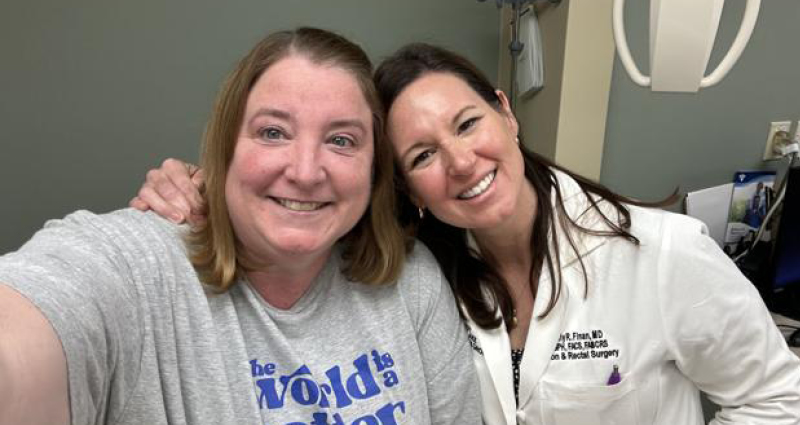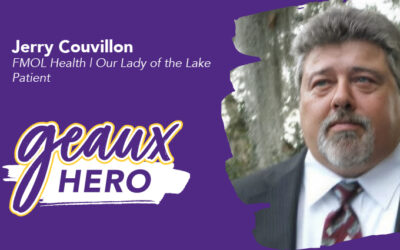In some ways, Alison Teal wasn’t shocked when she learned she had Stage 3 rectal cancer in the summer of 2022.
Both of Teal’s parents, as well as two brothers, had gone through their own bouts with various forms of the disease. Teal always had a nagging feeling she may eventually develop breast cancer, which her mother survived. With that family history in mind, she suspected something was amiss when she began having unexplained bleeding and a general unwell feeling in early 2022.
“In May of that year, I had my routine yearly appointment with my doctor, and she said we needed to do a colonoscopy because we hadn’t done one the year before,” Teal said. “I did that in July, and I remember waking up from it and asking if I had cancer. I just knew. She told me there was a spot they needed to check, but I didn’t need to know any more. I knew what it was.”
A Swift and Thorough Response
Things moved quickly over the next several weeks. The cancer diagnosis was confirmed quickly, and Teal was soon scheduled to meet with a radiologist, a surgeon and a medical oncologist, all thanks to the team at Our Lady of the Lake Cancer Institute stepping in to find providers and make appointments. Soon after, Teal began a grueling regimen of radiation, followed by chemotherapy, with plans for a future surgery.
Dr. Kelly Finan, a board-certified colon and rectal surgeon at Our Lady of the Lake, said that process has become more common over the past two decades as studies have shown most colorectal cancer patients fare better if given therapies first.
“For patients with rectal cancer in Stage 2 or Stage 3, we give chemotherapy and radiation, followed by another course of chemotherapy,” Dr. Finan said. “After that, we look at the patient again and re-stage. If they have had a complete clinical response, meaning it appears their cancer has fully regressed on endoscopy and repeat X-rays, they have the option to enter a watch-and-wait protocol and not move directly into surgery.”
Dr. Finan said about 25 to 30 percent of patients in the watch-and-wait protocol will eventually have some cancer recurrence on routine surveillance and will need surgery. Thus far, Teal has remained cancer-free and has avoided an operation thanks to the effectiveness of her radiation and chemotherapy.
“About two days after my surgery was canceled, a friend called and told me that another one of her friends ended up getting my surgery date. She was diagnosed with rectal cancer as well and her surgery needed to happen quickly,” Teal said. “Throughout all of this, I feel like I was getting little winks from God, and that was another one.”
Navigating Treatment with Support
Although Teal avoided surgery, there were plenty of days filled with pain and challenging moments. Amid her treatment, her mother moved from Baton Rouge to Gonzales to be closer, and Teal and her husband built a new home so all three of them could live on the same property. Knowing her family was close, including her two grown children and granddaughter, gave Teal a source of support that helped her make it through some of the more difficult moments.
Dr. Finan said that for colorectal cancer patients, having the support of family and friends is a crucial part of treatment, especially since chemotherapy and radiation have cumulative effects that tend to worsen as time goes on.
“Having people around you who can keep your spirits up, take you to and from appointments, provide meals and just be there for you is invaluable,” Dr. Finan said. “It can reinvigorate relationships because people become closer and appreciate life more. It makes me feel great that we can offer so much here in Baton Rouge to give more people the opportunity to stay closer to their loved ones. We have such a large multifunctional team – surgeons, oncologists, radiologists, patient navigators, pathologists, nutritionists and so many others. That shows that Our Lady of the Lake Cancer Institute is committed to investing in resources to improve cancer care here.”
Finding Strength and Sharing Advice
Teal doesn’t like to spend a lot of time thinking about things she would have done differently. Instead, she’s focused on her family, including supporting her husband through his current cancer battle, as well as her work with a local school system and caring for others. But, she does advise people to not ignore anytime they sense something unusual is happening with their bodies.
“I knew for months that something was different before my diagnosis,” she said. “I tell anybody who feels that way to get themselves checked out. You know your body better than anybody else. If it turns out to be nothing, you’ll have peace of mind. If it is something to deal with, you’ll have the information you need to start fighting.”




